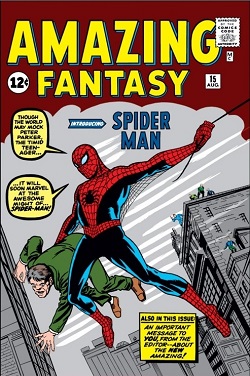 The story has almost attained myth status in our culture. Brainy, often-bullied, tragically-parentless adolescent has accidental encounter with dangerously powerful lab experiment. Bitten by an unnaturally fortified spider, he soon begins to develop spider-like qualities himself. He discovers that he has faster-than-human reflexes, can climb walls, and can do amazing things with webs. (Fortunately for him, compound eyes, extra limbs, and complicated new mouth parts are not part of the package.)
The story has almost attained myth status in our culture. Brainy, often-bullied, tragically-parentless adolescent has accidental encounter with dangerously powerful lab experiment. Bitten by an unnaturally fortified spider, he soon begins to develop spider-like qualities himself. He discovers that he has faster-than-human reflexes, can climb walls, and can do amazing things with webs. (Fortunately for him, compound eyes, extra limbs, and complicated new mouth parts are not part of the package.)
The youth struggles to come to terms with his new-found abilities and how his life must change. In most versions of the story, he has a conversation with his foster father, Uncle Ben, who delivers the famous aphorism: “With great power comes great responsibility.”
The good uncle was almost right.
The voice of wisdom in the tale correctly recognized that power and responsibility go together. And certainly when individuals come upon power unexpectedly they ought to ponder what responsibilities they must also have. But by putting power first, Uncle Ben expressed a popular misunderstanding—a reversal of the actual order of things. And because we are so prone to be confused about power, the difference is important. Scripture reveals that responsibility comes first, and then power. And this is true for power in the sense of ability as well as power in the sense of authority.
 The story has almost attained myth status in our culture. Brainy, often-bullied, tragically-parentless adolescent has accidental encounter with dangerously powerful lab experiment. Bitten by an unnaturally fortified spider, he soon begins to develop spider-like qualities himself. He discovers that he has faster-than-human reflexes, can climb walls, and can do amazing things with webs. (Fortunately for him, compound eyes, extra limbs, and complicated new mouth parts are not part of the package.)
The story has almost attained myth status in our culture. Brainy, often-bullied, tragically-parentless adolescent has accidental encounter with dangerously powerful lab experiment. Bitten by an unnaturally fortified spider, he soon begins to develop spider-like qualities himself. He discovers that he has faster-than-human reflexes, can climb walls, and can do amazing things with webs. (Fortunately for him, compound eyes, extra limbs, and complicated new mouth parts are not part of the package.)
Discussion